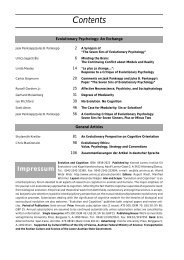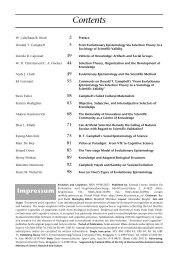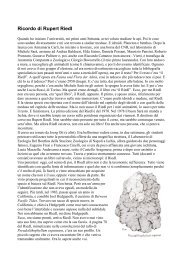Contents - Konrad Lorenz Institute
Contents - Konrad Lorenz Institute
Contents - Konrad Lorenz Institute
You also want an ePaper? Increase the reach of your titles
YUMPU automatically turns print PDFs into web optimized ePapers that Google loves.
Ingo Brigandt<br />
the founders of ethology. Indeed, LORENZ’s remarks<br />
about Gestalt perception are intended to show that<br />
there is an important and powerful cognitive mechanism<br />
that is able to get knowledge out of what has<br />
been observed. The discussion shows that there exist<br />
several items that are used to justify the observational<br />
approach, but the tenets about observation<br />
are not employed to justify any of the other items.<br />
Induction and Gestalt perception justify the hypothesis-independency<br />
of observation, and the<br />
qualitativeness of the approach is substantiated by<br />
Gestalt perception. The ideas about entirety justify<br />
the fact that organisms are to be studied in their natural<br />
environment, while the view that all features<br />
have to be observed is supported by all three items<br />
(induction, Gestalt perception, and entirety).<br />
From a historical point of view it is highly plausible<br />
that the observational method is the main target<br />
of <strong>Konrad</strong> LORENZ’s justificatory efforts. For one of<br />
the main intentions of LORENZ’s post-war defense of<br />
his works was to show that non-quantitative, largely<br />
theory-independent observations are in fact scientific<br />
(this is explicit in 1958, pp246, 256; 1959, p281;<br />
1963a, p1; 1973, p1; 1981, pp40, 68ff). LORENZ felt<br />
that his ideas on observation were not taken seriously<br />
by many animal psychologists and that he had<br />
a difficult task of making clear that qualitative observations<br />
are a necessary step of research. Indeed, in<br />
his view the biological community as whole focused<br />
alone on measurement and statistical evaluation of<br />
data as the ideal of rigorous science.<br />
Originally LORENZ discussed the importance of<br />
Gestalt perception without suggesting that his<br />
methodological approach might be in need of defense<br />
(1948, 1951). In the 50s and 60s, however, he<br />
criticized especially behaviorist and American animal<br />
psychology in the context of defending his<br />
views. LORENZ states, for instance, that the paper Gestalt<br />
perception… is targeted at American animal psychologists<br />
(1958, p256). However, it is not just the<br />
case that LORENZ had to defend his methodological<br />
views against the influential tradition of behaviorism<br />
and other theoretical approaches that had a radically<br />
different approach. Some of the remarks in the<br />
writings of the 60s and 70s were directed at biologists<br />
in general, because<br />
LORENZ felt that his observational<br />
approach was considered<br />
by many biologists (including<br />
German-speaking<br />
biologists) as not being really<br />
rigorous science. For instance,<br />
LORENZ complained about rec-<br />
Author’s address<br />
Ingo Brigandt, Department of History and<br />
Philosophy of Science, 1017 Cathedral of<br />
Learning, University of Pittsburgh, Pittsburgh,<br />
PA 15260. Email: inb1@pitt.edu<br />
ommendations given by reviewers about a grant application<br />
to the Deutsche Forschungsgemeinschaft<br />
(German Research Council).<br />
“The grant was approved, but not without the advisory<br />
board adding a little benign admonition: care<br />
should be taken, lest the investigation lapse into<br />
merely being descriptive, “daß die Untersuchung<br />
nicht ins Deskriptive abgleitet.” (1973, p5).<br />
In addition, LORENZ reacted furiously to the attempt<br />
to remove Otto KOENIG as the director of the<br />
Austrian Institut für Vergleichende Verhaltensforschung<br />
(<strong>Institute</strong> for Comparative Ethology). Some<br />
of the board members stated that the research at the<br />
institute was in bad shape. The justification is revealing.<br />
On their account, comparative ethology is<br />
a amateur program instead of rigorous biology—just<br />
making photographs does not presuppose a university<br />
degree and the crucial feature of making measurements<br />
is not seriously pursued.<br />
“In einer Sitzung des Kuratoriums für das Institut<br />
für Vergleichende Verhaltensforschung haben MA-<br />
RINELLI und der Physiologe Prof. KMENT den Versuch<br />
unternommen, Otto KOENIG hinauszuschmeißen…<br />
MARINELLI: Tierhaltung sei nur ein Hobby, die Herstellung<br />
von Filmen verlange kein Hochschulniveau<br />
(das Wort Hochschulniveau kommt in dem<br />
sechs Seiten langen Protokoll der Sitzung 7× vor.)<br />
Die vergleichende Verhaltensforschung sei ein Dilletantenprogramm.<br />
KMENT (S. 2 unten) gibt eine<br />
völlig falsche Vorstellung von unserem Institut und<br />
seiner Arbeitsweise. KMENT meint, “entscheidend sei<br />
die Messung, man müsse messend vorgehen” und<br />
der alte Blödsinn usw.” (LORENZ, letter to STRESE-<br />
MANN, February 17, 1971; the letter to STRESEMANN<br />
includes a copy of the minutes of the board meeting,<br />
showing that these accusations were actually<br />
raised).<br />
Thus the main target of LORENZ’s justificatory efforts<br />
is his observational approach, and he felt the<br />
need to defend his methodological views against<br />
general trends and conceptions in biology and behavioral<br />
science. Despite the fact that LORENZ recognized<br />
the importance of experiments and quantitative<br />
techniques he viewed the scientific contempt<br />
for qualitative observation as part of a generally increasing<br />
disregard for nature.<br />
While we may wonder<br />
whether Gestalt perception is<br />
really as important for ethological<br />
observations as<br />
LORENZ maintained, we are<br />
still not quite clear about the<br />
epistemic significance and re-<br />
Evolution and Cognition ❘ 168 ❘ 2003, Vol. 9, No. 2








